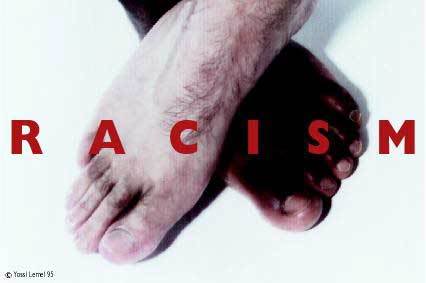 It is pretty easy to be against Obamacare these days. The federal government can’t come up with a working website to help people buy health insurance. The President misled people about whether they could hold onto their old insurance plans. And come next tax day, the least popular provision of the Affordable Care Act – the individual mandate – will be implemented for the first time.
It is pretty easy to be against Obamacare these days. The federal government can’t come up with a working website to help people buy health insurance. The President misled people about whether they could hold onto their old insurance plans. And come next tax day, the least popular provision of the Affordable Care Act – the individual mandate – will be implemented for the first time.
Lost amidst all this controversy is the very strong likelihood that once Obamacare is fully implemented, and the disastrous healthcare.gov website is functioning properly, the law will mean health insurance for millions of previously uninsured Americans. And the people most likely to benefit from this law, according to a recent study, are blacks and Hispanics who not only have higher rates of uninsurance, but also frequently demonstrate greater need for medical care.
Which raises a question: is it racist to oppose the Obamacare efforts to increase health insurance in the United States?…(Read more and view comments at Forbes)
What Do People Think About When Choosing Health Insurance Plans?
 Here is a discussion I had with Tess Vigeland of Los Angeles Public Radio about the psychology of choosing health plans.
Here is a discussion I had with Tess Vigeland of Los Angeles Public Radio about the psychology of choosing health plans.
(Click here to view comments)
Obamacare and the End of Employer-Based Health Insurance
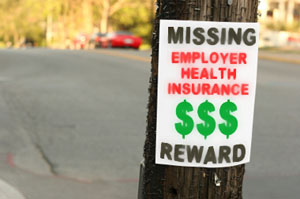 According to the American Action Forum, 43 million American workers will lose access to employer-based health insurance coverage because of Obamacare. Critics of the Affordable Care Act (ACA) have warned that the creation of health insurance exchanges, and federal subsidies for people earning less than 400% of the federal poverty limit, practically invites employers to stop offering coverage to their employees, so the federal government picks up the tab. Some supporters of the ACA even celebrate this possible exodus from the employer-based insurance market, figuring it is prelude to a government takeover of the healthcare industry.
According to the American Action Forum, 43 million American workers will lose access to employer-based health insurance coverage because of Obamacare. Critics of the Affordable Care Act (ACA) have warned that the creation of health insurance exchanges, and federal subsidies for people earning less than 400% of the federal poverty limit, practically invites employers to stop offering coverage to their employees, so the federal government picks up the tab. Some supporters of the ACA even celebrate this possible exodus from the employer-based insurance market, figuring it is prelude to a government takeover of the healthcare industry.
What is missing amidst all these claims and controversies is good old-fashioned data. Fortunately, recent research published in the journal Health Affairs provides some levelheaded evidence about what has been happening to employer-based insurance over the past decade, and what we can expect to happen in the future.
The first article was written by Thomas Buchmueller and colleagues, from the University of Michigan. The Michigan team began by analyzing trends in employer-based health insurance coverage in the United States from 2000 to 2011. Trend number one, illustrated in the picture below, serves to remind us that big companies – with 100 or more employees – have consistently offered health insurance to their employees over this period of time, while insurance coverage has been much more hit or miss for smaller firms… (Read more and view comments at Forbes)
Health Insurance Exchanges in One Picture
Here is an excellent picture from the New England Journal of Medicine, illustrating which states have chosen to run their own exchanges, which are relying on the federal government, and which are following some kind of hybrid approach. Unsurprisingly, the distribution of states pretty closely mirrors the outcome of the most recent presidential election.
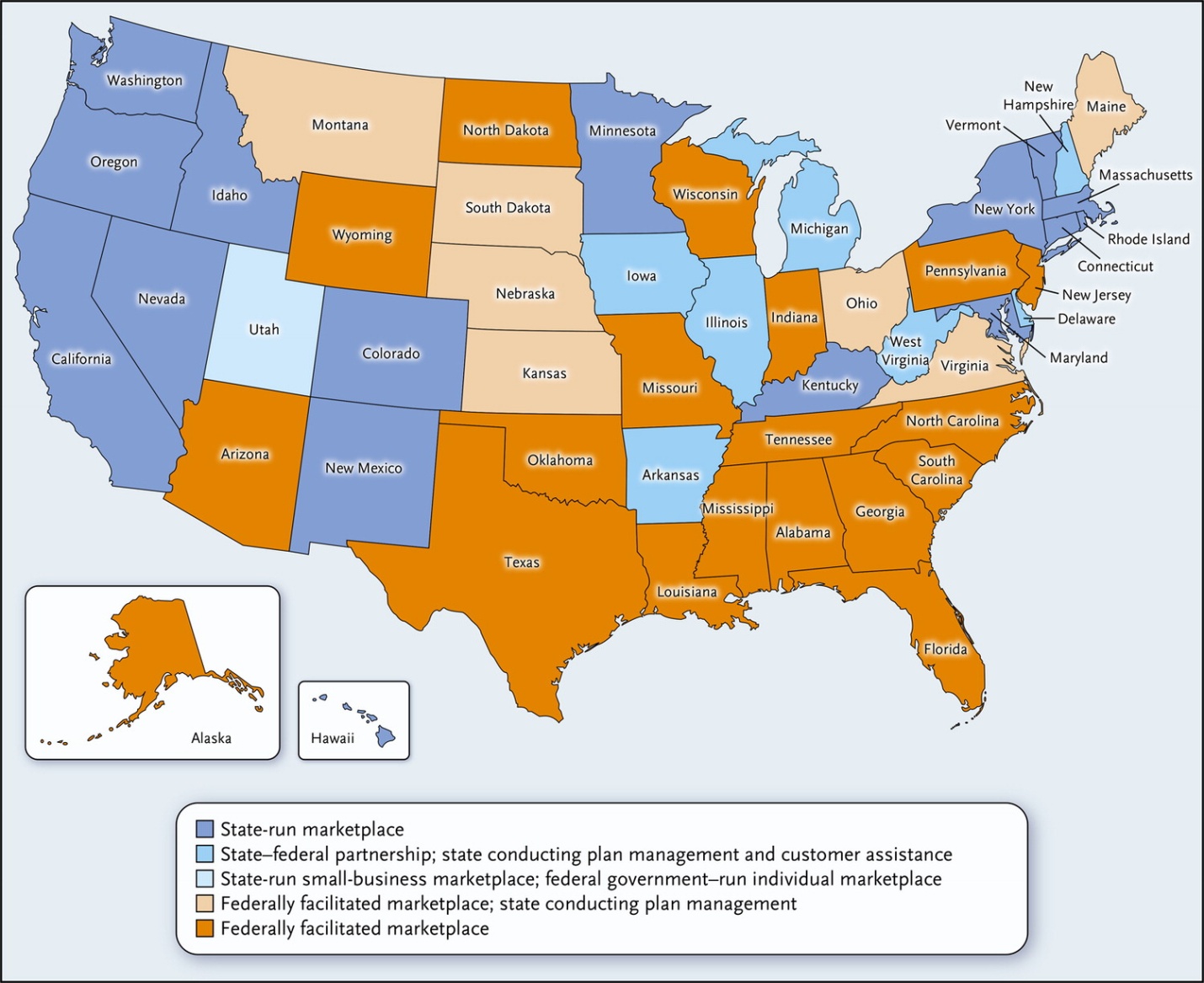
(Click here to view comments)
Bargaining Power in Health Plan Negotiations
 Thousands of children have passed through the doors of Vanderbilt’s Monroe Carell Jr. Children’s Hospital. The lobby is bright, full of natural light and decorated in bold colors and kid-friendly shapes such as stars. It hums with the quiet chaos of sick and recovering children.
Thousands of children have passed through the doors of Vanderbilt’s Monroe Carell Jr. Children’s Hospital. The lobby is bright, full of natural light and decorated in bold colors and kid-friendly shapes such as stars. It hums with the quiet chaos of sick and recovering children.
The building opened as Nashville’s first and only freestanding children’s hospital in 2004 and a $30 million expansion was added this year. And while the hospital does many things for patients every day, its capacity to care for children holds great weight for Vanderbilt’s business side. Namely, the hospital brings the university tremendous bargaining power when discussing reimbursement rates with insurance companies.
“It’s huge, it’s just huge, right?” says Peter Ubel, a professor of marketing and public policy at Duke’s Fuqua School of Business. “If you’re a big employer and you don’t offer an insurance plan that includes that children’s hospital, all of your employees with kids are going to be up in arms” …(Read more and view comments at The Tennessean)
Debate Rages Over Obamacare, Medical Costs
 When Dr. Jeffrey Rice needed to schedule outpatient foot surgery for his son three years ago, he called the recommended facility to find out what it would cost. The estimate was so high — $15,000 to $25,000 — that Rice asked the surgeon for a second option. The cost for the same one-hour procedure at an outpatient surgery center in a slightly more convenient location: $1,500.
When Dr. Jeffrey Rice needed to schedule outpatient foot surgery for his son three years ago, he called the recommended facility to find out what it would cost. The estimate was so high — $15,000 to $25,000 — that Rice asked the surgeon for a second option. The cost for the same one-hour procedure at an outpatient surgery center in a slightly more convenient location: $1,500.
Rice’s experience isn’t an anomaly. Costs for identical medical procedures can vary by thousands of dollars from clinic to clinic, city to city and state to state, according to federal data and other sources.
With the next phase of the Affordable Care Act kicking in Oct. 1, when individuals can begin enrolling in state-run health exchanges, debate rages over whether health care reform will do anything to rectify such pricing disparities or help lower costs.
The 2010 law, widely known as Obamacare, is meant to address the availability and cost of health insurance, not necessarily the cost of specific services. Still, supporters believe that because it paves the way for universal health care coverage, the resulting larger pool of insured patients should lower costs in the long run… (Read more and view comments here)
Great Video Explaining Health Insurance Exchanges
Regular followers of my blog probably realize by now that I am a big fan of Sarah Kliff , at the Washington Post, who does a great job of reporting on the many ups and downs of Obamacare. Here is a video Sarah just put together, explaining the health insurance exchanges which go “live” today, October 1.
All of you out there who teach health policy: this is a good video to point your students toward.
(Click here to view comments)
Blue Cross Previews Health-Exchange Plan Rates
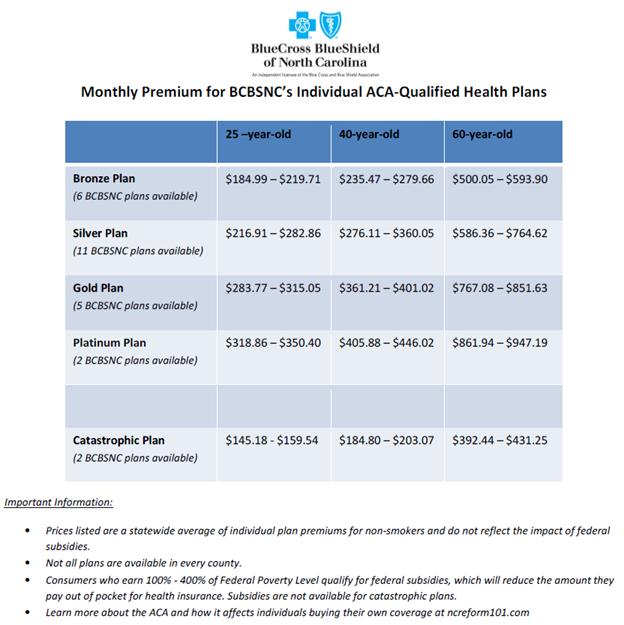 Blue Cross and Blue Shield of North Carolina will offer individual health plans through new on-line exchanges ranging from $185 for the lowest-cost plan for 25-year-olds to $947 for the top plan for a 60-year old.
Blue Cross and Blue Shield of North Carolina will offer individual health plans through new on-line exchanges ranging from $185 for the lowest-cost plan for 25-year-olds to $947 for the top plan for a 60-year old.
Those rates were among those the insurer included Thursday in a preview of the plans it will look to sell through the online exchange launching as part of the federal health care overhaul.
The insurer is one of three insurance companies that filed to sell insurance through the exchange in North Carolina. Blue Cross said it’s the only insurer that’s offering coverage in every county in the state.
The exchange is an online health insurance store that will open for business Oct. 1, and will close in March. Next year, federal law will require people to have insurance or face a penalty. The penalty starts at $95 an adult, or 1 percent of income – whichever is higher – next year…(Read more here)
Fear Mongering in Obamacare Debates
 Here is a link to a story run by Marketplace on the crazy advertisements trying to influence whether people buy health insurance on the new Obamacare health insurance exchanges. The producers at Marketplace did an amazing job of making me sound almost semi-coherent. I’d love to hear your thoughts on the topic – the topic being these crazy ads, not my semi-coherence.
Here is a link to a story run by Marketplace on the crazy advertisements trying to influence whether people buy health insurance on the new Obamacare health insurance exchanges. The producers at Marketplace did an amazing job of making me sound almost semi-coherent. I’d love to hear your thoughts on the topic – the topic being these crazy ads, not my semi-coherence.
(Click here to view comments)
Let the Health Insurance Exchanges Begin!
Pretty soon, people will be able to start shopping for health insurance on the infamous Obamacare exchanges. In North Carolina, one of the states asking the feds to take the lead in this effort, only one insurer is offering insurance coverage in every county of the state. That is Blue Cross Blue Shield, and they just announced their rates. Here they are:
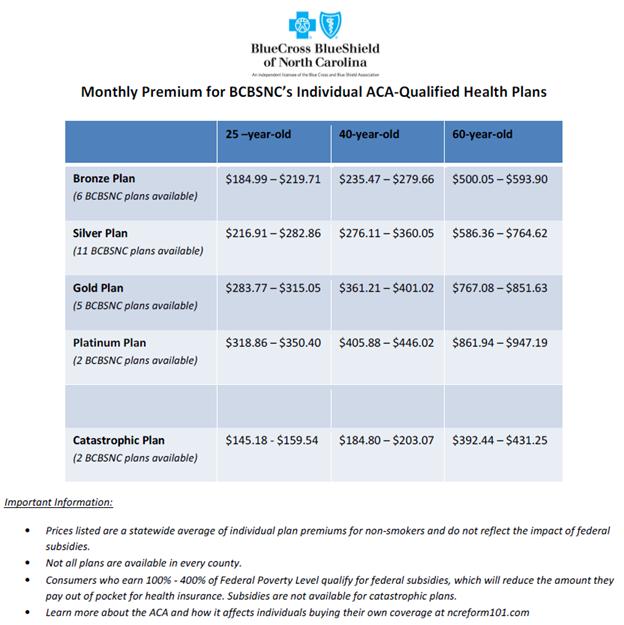
What do you think: look like any good deals out there?

